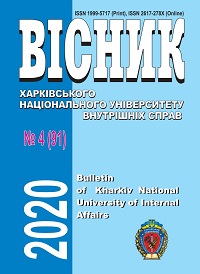New Directions of Mediation Development in Ukraine
Abstract
The rapid development of public relations in view of the spread of the new disease and acute crisis has an impact on all social institutions without exception. Mediation is no exception, so the current subject of the research is the analysis of new areas of the development of the social and legal institution of mediation in Ukraine. The purpose of the article is to identify new areas of mediation development in Ukraine, taking into account the impact of the COVID-19 pandemic on the most important areas of public life. In accordance with the purpose, the following tasks are formulated: to research the features of mediation in the field of health care; to study the development of online mediation; to study the features of school mediation as a mean of combating bullying. The research was based on a forecasting method to determine the perspectives for the use of mediation to resolve acute social conflicts.
New directions of mediation development in Ukraine have been studied in view of the COVID-19 pandemic and the caused social, political and economic crisis. New challenges of today are considered, where mediation should become an effective tool: a growing number of medical and family disputes, combating domestic violence, combating bullying (school mediation). The slow process of institutionalization of mediation hinders its accessibility, so online mediation may be a new direction of its development in Ukraine. The need to create legislation on mediation remains relevant, which should provide regulations on mediation on the Internet. Modern mediators must adapt new requirements of their activities: to acquire new knowledge (in particular, in the field of medicine as the most perspective area) and use the Internet space for mediation. School mediation should be further promoted and understanding services should be encouraged to prevent violence among children.
Downloads
References
2. Halai V.O., 2008. Patient-physician negotiations as an opportunity for voluntary cooperation to resolve the conflict [Perehovory «patsiient-likar» yak mozhlyvist dobrovilnoi spivpratsi dlia urehuliuvannia konfliktu]. In: Seniuta I. Ya. and Tereshko Kh. Ya. (eds). Medical law of Ukraine: legal status of patients in Ukraine and its legislative support (genesis, development, problems and prospects for improvement) [Medychne pravo Ukrainy: pravovyi status patsiientiv v Ukraini ta yoho zakonodavche zabezpechennia (henezys, rozvytok, problemy i perspektyvy vdoskonalennia)]. Lviv, 17-18 April. Lviv: Lvivskyi oblasnyi blahodiinyi fond. Pp. 70-73.
3. Shamlikashvili Ts.A., Ostrovskii A.N., Kabanova E.V. and Sil`nitskaya A.S, 2017. Health mediation: from enforcement to dialogue on rights. [Mediatsiya v zdravookhranenii: ot pravoprimeneniya k dialogu o pravakh]. Sociologiâ mediciny – Sociology of Medicine, Vol. 16, No. 2, pp. 75-81.
4. Novytska I., 2020. The impact of the COVID-19 epidemic on the level of domestic violence in Ukraine and the world [Vplyv epidemii COVID-19 na riven domashnoho nasyllia v Ukraini ta sviti]. In: National Academy of Internal Affairs et al. Ensuring the prevention and combating of domestic violence, gender-based violence and combating trafficking in human beings: national practice and foreign experience [Zabezpechennia zapobihannia ta protydii domashnomu nasylstvu, nasylstvu za oznakoiu stati ta protydii torhivli liudmy: natsionalna praktyka ta zarubizhnyi dosvid]. Kyiv, 14 December. Kyiv: Natsionalna akademiia vnutrishnikh sprav. Pp. 134-137.
5. Rozumna M., 2020. Current issues and prospects for the development of alternative dispute resolution in Ukraine: online mediation and mediation [Aktualni problemy ta perspektyvy rozvytku alternatyvnykh sposobiv urehuliuvannia sporiv v Ukraini: onlain-mediatsiia ta poserednytstvo]. Pìdpriêmnictvo, gospodarstvo ì pravo – Entrepreneurship, Economy and Law, No. 9, pp. 147-153.
6. Gruzdeva E.A., 2020. Models of online mediation in educational [Modeli onlain-mediatsii v usloviyakh obrazovatel`noi sistemy]. Molodoj učenyj – Young Scientist, No. 4, pp. 288-290.
7. Rybalka V.V., Pomytkin E.O., Ihnatovych O.M. et. al., 2020. Psychological prevention and personal hygiene in counteracting the COVID-19 pandemic [Psykholohichna profilaktyka i hihiiena osobystosti u protydii pandemii COVID-19]. Kyiv: Instytut pedahohichnoi osvity i osvity doroslykh im. I. Ziaziuna NAPN Ukrainy.
8. Utemisova G.U. and Vasyagina N.N., 2020. Cyberbullying during COVID-19: on the issue of security in the Internet space [Kiberbulling vo vremya COVID-19: k voprosu o bezopasnosti v internet-prostranstve]. In: Ural State Pedagogical University. Strategic guidelines for modern education: international pedagogical forum [Strategicheskie orientiry sovremennogo obrazovaniya]. Ekaterinburg, 5-6 November. Ekaterinburg: Ural`ski gosudarstvennyi pedagogicheskii universitet. Pp. 249-251.
9. Volchenko L.P., 2018. Socio-psychological features of overcoming conflict situations among high school students – the experience of school mediation [Sotsialno-psykholohichni osoblyvosti podolannia konfliktnykh sytuatsii v seredovyshchi starshoklasnykiv – dosvid shkilnoi mediatsii]. Teoretičnì ì prikladnì problemi psihologì – Theoretical and Applied Problems of Psychology, No. 1, pp. 88-98.
10. Lesko N., 2018. The phenomenon of violence against children in the educational environment of Ukraine [Fenomen nasylstva nad ditmy v osvitnomu seredovyshchi Ukrainy]. Traektoriâ Nauki, Vol. 4, No. 5, pp. 1001-1007.
Copyright (c) 20210 K. S. Tokarieva

This work is licensed under a Creative Commons Attribution 4.0 International License.




